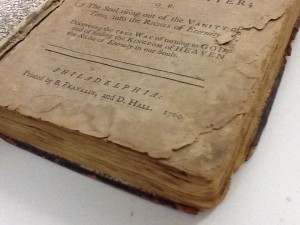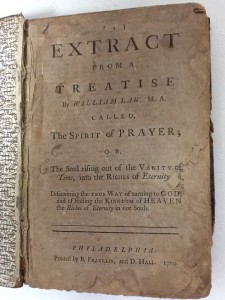By: Ashley Bond, SLIS graduate student

A Collection of Devotional Tracts was printed by Benjamin Franklin and David Hall in 1760 (Hoole Library Special Collections BR55 .C65 1760)
In May 2011, Dean Louis A. Pitschmann of the University of Alabama Libraries acquired A Collection of Devotional Tracts along with the donation of a second book entitled Character Sketches. Currently located in Hoole Library Special Collections, A Collection of Devotional Tracts consists of separate pamphlet issues published between 1759 and 1760, all of which were printed in either Philadelphia by Benjamin Franklin or Germantown by Christopher Sauer (later anglicized as Sower), Jr. Other contributors include Anthony Benezet (as both author and publisher), authors William Dell, Thomas Hartley, William Law, John Rutty, and François de Salignac de La Mothe-Fénelon, printer David Hall, and signer Paul Osborn. Originally, Quaker schoolmaster Anthony Benezet, from Philadelphia, Pennsylvania, collected and bound the collection in 1760 with the intent of distributing its five-hundred original copies throughout Maryland and Virginia. While the tract was originally published by the Quakers in England two years prior, this is the first American edition of the work as well as the very first abolitionist tract printed in the United States. The included pamphlets address themes of Christian religion, namely Quakerism and teachings of the Society of Friends. This includes topics of baptism, salvation, prayer, and even the moral depravity of slave trade, all of which were relevant to society in the context eighteenth and nineteenth century America.
Historically, many of the names involved in this publication have great cultural significance. Printer Christopher Sauer, Jr.’s (1721-1784) father was renowned printer Christopher Sauer, Sr. (1693-1758), responsible for issuing both the first printed German newspaper in America in 1739 and the very first American Bible printed in 1743. When Sauer I died on September 25, 1758, his son continued his printing business. Benjamin Franklin (1706-1790), also important to the publication of this historic document, may very well be one of the most famous names in United States history. From his scientific exploration of electricity to his well-known Poor Richard’s Almanac, Franklin could be considered one of the most innovative minds of his time. Interestingly, he is also the only person to sign three of the most important documents in the history of the United States: the Declaration of Independence, the Constitution, and the treaty of peace that ended the Revolutionary War with Britain. David Hall (1714-1772), also involved with the printing of A Collection of Devotional Tracts, began his career as a journeyman printer in Scotland. In 1743, Benjamin Franklin invited Hall to be partner of his Philadelphia printing firm where together they ran the newspaper Pennsylvania Gazette. Eventually he was so successful, Hall purchased Franklin’s share of the Franklin and Hall printing firm in February 1766 and continued the firm under new partnership Hall and Sellers. French-born Anthony Benezet’s (1713-1778) journey into American history began when he moved to Pennsylvania with his family in 1731 and joined the Religious Society of Friends. Although he originally attempted to follow in his father’s footsteps as a merchant, it was not long before he found his calling as an educator and began to teach those who lacked access to traditional schools. In 1770, he successfully convinced his religious community to build a free day school for African Americans. Benezet eventually became the abolitionist voice to his Quaker peers and later the general public.
The University of Alabama’s edition of A Collection of Devotional Tracts retains its original binding even though the title page no longer remains. Of the initial five-hundred tracts printed, there are several known existing copies today in locations throughout the United States including the Library of Michigan, Duke University, Wilmington College, the University of Pennsylvania, and the Library Company of Philadelphia. The University of Alabama’s Division of Special Collections invites visitors to come see A Collection of Devotional Tracts in person. Inside Hoole Library, located on the second floor of Mary Bryant Harmon Hall, students and faculty can peruse a valuable piece of United States history that represents eighteenth century print culture and many prominent figures in early Americana.
Students seeking additional secondary sources to provide more information on this topic should consider consulting a few of the following books, all of which are available in the general collection of Gorgas Library: Brycchan Carey and Geoffrey Plank’s edited volume Quakers and Abolition (2014); Brycchan Carey’s From Peace to Freedom: Quaker Rhetoric and the Birth of American Antislavery 16570-1761 (2012); The Business of Abolishing the British Slave Trade, 1783-1807 (1997); and Minutes, constitution, addresses, memorials, resolutions, reports, committees and antislavery tracts, 1794-1829 (1969).

